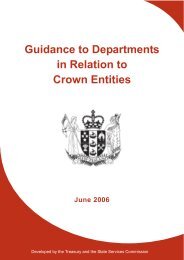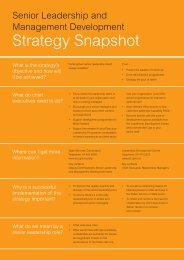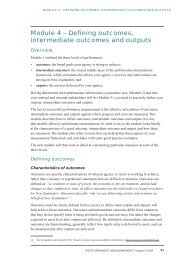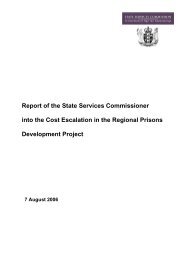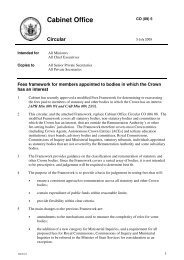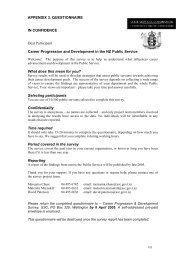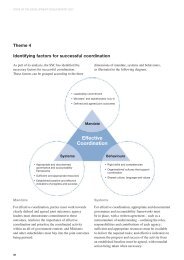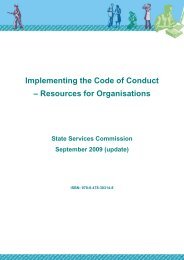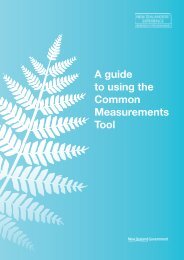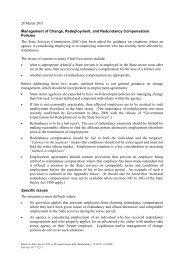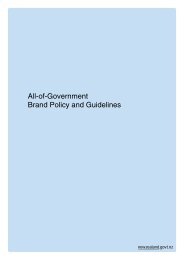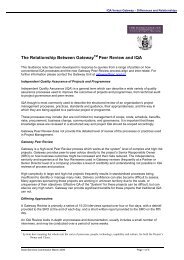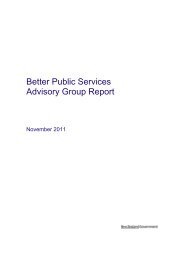Blank Doc with SSC Logo and RDMS Doc Number - State Services ...
Blank Doc with SSC Logo and RDMS Doc Number - State Services ...
Blank Doc with SSC Logo and RDMS Doc Number - State Services ...
Create successful ePaper yourself
Turn your PDF publications into a flip-book with our unique Google optimized e-Paper software.
97 The way any implementation agency approaches communication about change is critical<br />
to building confidence <strong>with</strong> key stakeholders. In terms of communicating this significant<br />
change to the sector, as one stakeholder put it, “you need to underst<strong>and</strong> what it is you are<br />
trying to do. You need to agree key messages, which are simple <strong>and</strong> straightforward, <strong>and</strong><br />
you need to keep saying them.” The Review Team agrees.<br />
1.6 Any other matter which the Review Team considers relevant to the<br />
foregoing questions<br />
98 There are three matters that the Review Team believes it is worth commenting on briefly.<br />
They need to be seen in the spirit of moving forward <strong>and</strong> implementing the 2005<br />
Scholarship successfully. They are:<br />
• Continuous improvement - implementation needs to be a process whereby the<br />
implementation team makes constant adjustments to the way it does things, to<br />
ensure a successful outcome. Any rigid adherence to an ideal (if this did indeed<br />
occur) will get in the way of a successful outcome.<br />
• Feedback loops – sector representatives who participate in the Leaders’ Forum<br />
need to be kept informed of policy <strong>and</strong> implementation decisions <strong>and</strong> issues in a<br />
continuous way. The Ministry <strong>and</strong> NZQA need to dedicate resource specifically<br />
to keeping the sector <strong>and</strong> its key stakeholders consistently well informed as well<br />
as involved in its consultative forums.<br />
• Building sector capacity in external assessment – the Scholarship <strong>and</strong> the wider<br />
NCEA call constantly on the same <strong>and</strong> small number of experienced teachers in<br />
the tertiary <strong>and</strong> secondary sectors. The Review Team believes that there is an<br />
urgent need to build up this capacity <strong>and</strong> a related need to review the conditions<br />
under which they are engaged to facilitate development.<br />
99 A final word on the debate about assessment. Norm-referenced assessment is at one end<br />
of the assessment spectrum <strong>and</strong> st<strong>and</strong>ards-based (or criterion-referenced) assessment lies<br />
at the other. Norm-referencing usually applies norms at the stage of assessment results<br />
<strong>and</strong> reporting, using an inherent underst<strong>and</strong>ing of st<strong>and</strong>ards to set the mean scores<br />
appropriate for an age group or cohort. St<strong>and</strong>ards-based approaches tend to apply norms<br />
at an earlier, pre-assessment stage, e.g. when setting students’ achievement st<strong>and</strong>ards.<br />
100 These positions are seen as opposing positions, though in fact it is more constructive to<br />
see them as complementary, not exclusive, <strong>and</strong> differing largely at the point where the<br />
norms are applied. Norms <strong>and</strong> st<strong>and</strong>ards in fact apply continuously throughout the whole<br />
education <strong>and</strong> assessment process. When teachers use exemplars they apply both norms<br />
<strong>and</strong> st<strong>and</strong>ards. So too do markers when they adjust schedules after assessing an initial<br />
selection of student’s scripts. There has been an international movement to focus more<br />
on st<strong>and</strong>ards-based assessment because of the balance of advantage it offers to teaching<br />
<strong>and</strong> learning. The intention of st<strong>and</strong>ards-based assessment is that teachers have better<br />
knowledge of a student’s success or failure before it is too late to do anything about it,<br />
students have improved knowledge of their targets, teachers improve their professional<br />
assessment skills, <strong>and</strong> deficiencies in the wider educational system are known.<br />
101 While both assessment approaches belong to the same spectrum, the reality is that the<br />
new 2004 Scholarship <strong>and</strong> NCEA were introduced in a climate of polarisation. This has<br />
affected the way in which the sector <strong>and</strong> the public perceive this major transition in<br />
secondary school education. These two approaches need not <strong>and</strong> should not be opposing<br />
<strong>and</strong> it is incumbent on both agencies but notably the Ministry to provide leadership in<br />
17



